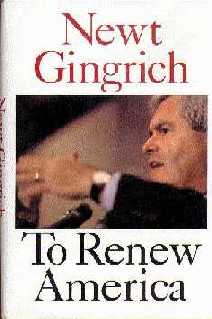Home |
Contents |
Photos |
News |
Reviews |
Store |
Forum |
ICI |
Educators |
Fans |
Contests |
Help |
FAQ |
Info


Gingrich Flunks "American Culture"
(5/12/96)
 Conservatives cry that we must return to America's core values, its one true culture. Unfortunately, they haven't been able to define these terms . . . until now. In his book To Renew America, Newt Gingrich does exactly that—tells us which traits make us truly American.
Conservatives cry that we must return to America's core values, its one true culture. Unfortunately, they haven't been able to define these terms . . . until now. In his book To Renew America, Newt Gingrich does exactly that—tells us which traits make us truly American.
Does Newt have it pegged? Let's see how his analysis bears up under scrutiny.
The spiritual dimension
First, Gingrich touts America's "spiritual dimension." As evidence he quotes four Americans—Benjamin Franklin, Thomas Jefferson, Abraham Lincoln, and Franklin Roosevelt—on the centrality of God.
These statesmen may have honored Him, but Newt has mistaken spirituality for religion. For instance, Jefferson and Lincoln weren't members of any organized church. Jefferson, Franklin, and the other Founding Fathers—Washington, Adams, Madison—considered themselves deists or Unitarians, not Christians. They believed in God only as an impersonal force of nature.
Jefferson, of course, led the calls for separating church and state. The other framers agreed, which is why the Constitution doesn't mention God or Christianity once. As a peace treaty ratified during Adams' presidency declared, "The Government of the United States of America is not in any sense founded on the Christian religion."
Individual responsbility
Second, Gingrich says Americans take individual responsibility rather than blame society. He again cites four examples: John Smith, Joshua Chamberlain, George Marshall, and Martin Luther King Jr.
Newt identifies Captain Smith because Smith told Jamestown's colonists, "If you don't work you won't eat." Ignore the fact that this Englishman had to beg the natives for food and shot them when they didn't cooperate. Smith, who arrived in 1607 and stayed only two years, wasn't an American.
Chamberlain exhorted his troops to fight for the Union, the common good. Marshall proposed what conservatives would now call a "bailout" of war-torn Europe. But King is perhaps Gingrich's most glaring lapse. Somehow Newt nominates the man who led millions in civil rights protests, who proclaimed, "The largest portion of white America is still poisoned by racism," as the epitome of personal responsibility.
The spirit of free enterpirse
Third, Gingrich champions America's "spirit of free enterprise," and offers Thomas Edison, Ray Kroc, Steven Jobs, and Bill Gates as representative. Although Scotsman Adam Smith first detailed capitalism, Newt has a point. Americans have developed free enterprise to its most ruthless extreme. Not only did they steal land from the Indians and conspire to form monopolies, but they practiced the vilest form of commerce ever known: slavery.
When American workers demanded safe working conditions, livable wages, and an end to round-the-clock toil, businessmen responded by beating and killing them. An unregulated economy led to a worldwide depression and to waste and pollution destroying the environment. The amount of natural resources consumed to make one McDonald's hamburger is appalling.
Ancient history? Hardly. From S&L failures to Microsoft's software dominion to involuntary servitude in sweatshops, not much has changed at all.
The spirit of invention and discovery
Fourth, Gingrich exalts America's superior commitment to "the spirit of invention and discovery." Once again—see the pattern?—he gives four names as proof: Robert Fulton, Eli Whitney, Samuel Morse, and the Wright Brothers.
What Gingrich fails to mention is that foreigners first invented, discovered, or explained everything from the basic elements to aspirin, atomic theory, bacteria, calculus, electromagnetism, evolution, fission, gravity, heart transplants, heredity, insulin, the internal combustion engine, IQ testing, the laws of motion, lighter-than-air travel, penicillin, psychoanalysis, quantum theory, radio, radioactivity, relativity, the steam engine, the telescope, vaccination, and x-rays.
Perhaps the best measure of scientific achievement is the Nobel prize, and again the record is telling. From 1901 to 1932, when Hitler's rise caused scientists to flee across the Atlantic, Americans won just three prizes in physics, two in chemistry, and one in medicine.
Pragmatism and the spirit of quality
Gingrich's last cultural plank is "pragmatism and the spirit of quality taught by Deming." He describes how Henry Ford's innovations led to the prevalence of assembly line management. When Edward Deming began seeking ways to increase productivity, he saw empowering workers as the key.
But America's captains of industry ignored him, so Deming went to Japan. As Gingrich admits, "For 30 years American management shrugged off Deming's theories while Japan adopted them as a national standard," leading to that country's remarkable growth.
Here the quality of Newt's thinking stands revealed. Incredibly, he claims Deming's ideas are "classically American," though Americans failed to adopt them until the 1980s, more than 200 years after the Revolution and decades after their success elsewhere. If Newt is right, how much more American are such strains as intolerance, imperialism, and genocide, which go back to the nation's very beginning?
In short, it's hard to imagine Gingrich was recently a practicing history professor. If he were a history student, one would have to give his thesis on American culture an F.
To Renew America
By Newt Gingrich
Published 1995
In bargain bins at overstocked bookstores everywhere
Related links
America's exceptional values
The myth of American self-reliance
Native vs. non-Native Americans: a summary
* More opinions *
|
|
. . .
|

|
Home |
Contents |
Photos |
News |
Reviews |
Store |
Forum |
ICI |
Educators |
Fans |
Contests |
Help |
FAQ |
Info
All material © copyright its original owners, except where noted.
Original text and pictures © copyright 2007 by Robert Schmidt.
Copyrighted material is posted under the Fair Use provision of the Copyright Act,
which allows copying for nonprofit educational uses including criticism and commentary.
Comments sent to the publisher become the property of Blue Corn Comics
and may be used in other postings without permission.
 Conservatives cry that we must return to America's core values, its one true culture. Unfortunately, they haven't been able to define these terms . . . until now. In his book To Renew America, Newt Gingrich does exactly that—tells us which traits make us truly American.
Conservatives cry that we must return to America's core values, its one true culture. Unfortunately, they haven't been able to define these terms . . . until now. In his book To Renew America, Newt Gingrich does exactly that—tells us which traits make us truly American.